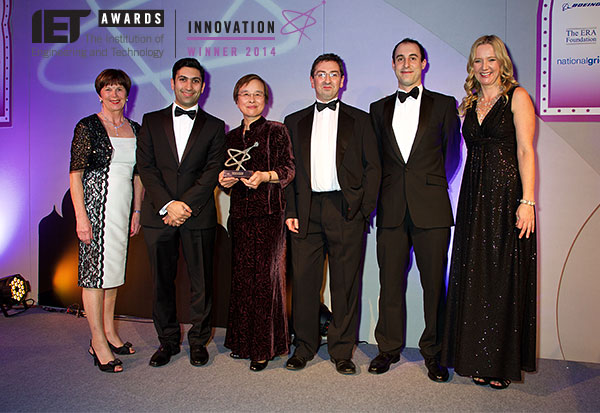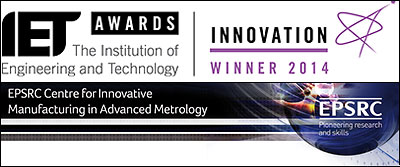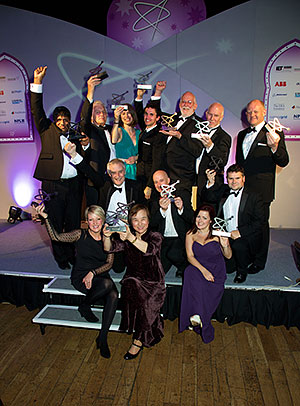EPSRC Centre wins coveted title at the IET's Innovation awards
 Pictured left to right: Category Chair Margaret Wood, ICW (UK) Ltd, with the team from the EPSRC Centre; Dr Hussam Muhamedsalih, Professor Jane Jiang, Simon McKenna and Dr Haydn Martin, accompanied by event host and BBC technology reporter Kate Russell.
Pictured left to right: Category Chair Margaret Wood, ICW (UK) Ltd, with the team from the EPSRC Centre; Dr Hussam Muhamedsalih, Professor Jane Jiang, Simon McKenna and Dr Haydn Martin, accompanied by event host and BBC technology reporter Kate Russell.
Fri, 21 Nov 2014 11:54:00 GMT
The University's EPSRC Centre for Innovative Manufacturing in Advanced Metrology wins the Manufacturing Technology category of the 2014 Innovation Awards by the Institution of Engineering and Technology (IET)
 SCIENTISTS at the University of Huddersfield have developed technology that is capable of measuring complex surfaces in microscopic detail, so that manufacturers can detect tiny but potentially serious defects. Now the breakthrough, which could lead to huge cost savings and environmental benefits, has received an important award.
SCIENTISTS at the University of Huddersfield have developed technology that is capable of measuring complex surfaces in microscopic detail, so that manufacturers can detect tiny but potentially serious defects. Now the breakthrough, which could lead to huge cost savings and environmental benefits, has received an important award.
The University’s EPSRC Centre for Innovative Manufacturing in Advanced Metrology – globally respected for its expertise in the science of measurement - has developed the Wavelength Scanning Interferometer (WSI). It can measure micro and nano geometry and surface topography and do so even when environmental conditions are exceptionally harsh.
Now the WSI has been named as 2014 winner in the Manufacturing Technology category of the annual Innovation Awards run by the Institution of Engineering and Technology (IET).
Professor Jane Jiang, a leading metrologist who is Director of Huddersfield’s EPSRC Centre, is delighted by the award.
“It’s great to receive such recognition from an institution as renowned and long-running as the IET. Hopefully this award will mean that we can continue to invest in the innovation for many more years, to ensure that factory targets are supported with the best available means,” she said.
 Pictured with the University's Professor Jiang (centre first row) at the the awards ceremony are all of the winners from the 2014 IET Innovation Awards.
Pictured with the University's Professor Jiang (centre first row) at the the awards ceremony are all of the winners from the 2014 IET Innovation Awards.
Wavelength Scanning Interferometer (WSI)
One of the first applications being investigated for the new device is the manufacture of roll-to-roll vapour barrier coatings for flexible PV (photovoltaic) cells. The WSI is able to detect defects in the coating that could drastically reduce the longevity of the product. Detecting and therefore minimising these defects will reduce the cost and increase the reliability of the flexible PV cells, leading to much more widespread adoption of this form of renewable energy.
The WSI sensor will have applications in many other areas, such as aerospace, automotive, semi-conductor, and bio-engineering applications. It can also be used during the manufacture of paper products such as banknotes and food packaging. Wherever WSI is used, it has the potential to slash manufacturing costs and help industry move towards zero waste and carbon-neutral production.
400 entries from 22 countries
The University of Huddersfield scooped the award by beating four other shortlisted entries, selected from over 400 entries from 22 countries.
William Webb, IET President said: “The IET Innovation Awards celebrate the best in global innovation, highlighting the rapid and exciting pace of development in today’s engineering and technology industry. Congratulations to the University of Huddersfield team for their win. They were selected from a highly impressive set of global innovations as one of the most forward thinking, pioneering innovations in the field.
“These awards are part of the IET’s mission to inspire engineering excellence, which last year provided over £500,000 to celebrate excellence and research in the sector and inspire the next generation of engineers and technicians. Our awards recognise and reward the industry’s elite, from apprentices and technicians at the start of their careers through to senior established professionals.”







